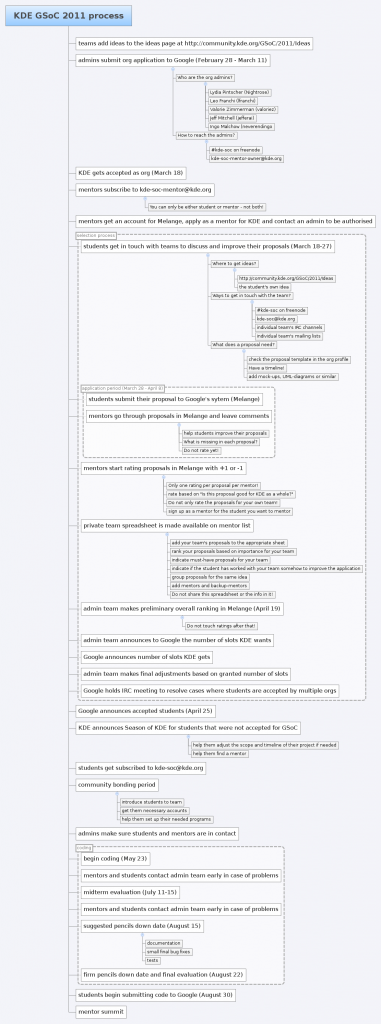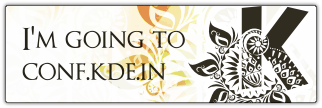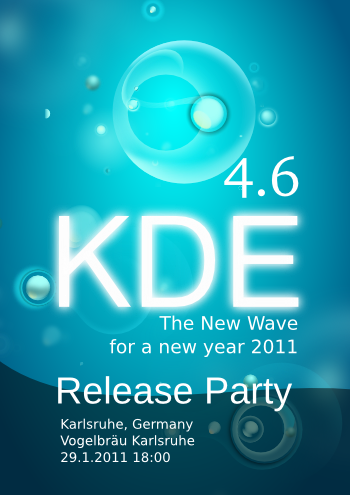For the last 1,5 months I’ve been herding cats for Google Code-in as the KDE admin. For those who are unfamiliar with Code-in: It’s a contest for 13 to 18 year olds to get involved in free software projects, one of them KDE. Today Code-in ended and the students (and mentors and me!) can get some rest 😉 And for me it’s time to write a wrap-up.
Boy, did the students rock! 300 closed tasks was my personal goal and in the end 338 where closed for KDE. Among them things like handbook writing for Amarok, bug triage for KHTML, coding on Marble, Rekonq and others, doing cool video clips for promo and edu and much much more. You might already have seen some of the work on PlanetKDE and more posts will follow. It’s been an amazing ride.
Let me write a bit about KDE’s experience. I’ve asked the mentors to tell me what they liked and didn’t like about the contest. First of all nearly everyone agreed that this is a really cool program. I don’t think we’ve had one before where we got so much done in such a short time with such a largely high-quality output. It’s a great opportunity for students to get to know high-profile free software projects with clear tasks for them to work on. It is great to see how some of the students gain confidence with each task they do and are proud of what they achieved. For me personally the hardest part was having to tell some students that their work wasn’t good enough yet – that they should push themselves a bit more (which they always could). Code-in being a contest encourages students to rush. This is great because it gets so much done but it needs mentors to keep an eye on quality with some students. That being said I was thrilled to see the first very good patch come in only a few hours after the contest had opened.
The other thing that made this a very demanding time for me is the fact that both students and mentors needed an enormous amount of hand-holding with the web app. It’s the same application that is being used for Google Summer of Code and I know it’s quirks and can probably navigate people through it while sleeping by now but new mentors and students had a lot of problems with it and needed help.
For future versions of the contest I’d like to see a few improvements that would make the life of mentors, admin and students a lot easier. Currently a student could only work on one task at a time and needs to wait for his mentor to approve the task before he could claim the next task. Then he has to wait again until the mentor of that next task approves his request and he can start working. This system is very demanding for a contest. It could be improved by allowing students to claim their next task once they have submitted the result of their current task. But as we’ve already learned with GSoC and Season of KDE: mentoring takes time and is demanding – in Code-in doubly so. The other major bottle-neck (which I think/hope I managed pretty well) is the admin. He/she needs to approve every single task the mentors suggest in the web app before students get to see them. This is good to make sure the tasks are ok, are not too easy or too hard and have enough details for the students to start working on them. However it also means that I’ve constantly had mentors and students pinging me to approve tasks. If you don’t have a very attentive admin this is not ideal – given that the contest ran over Christmas this probably happened in a few orgs. Next time I should probably try to get more people for screening tasks.
Oh and one last thing: the naming is a bit unfortunate. I’ve had to explain multiple times that Code-in isn’t actually just about code but also artwork, translations, promotion, testing and much more.
To sum it up Code-in has been an amazingly useful and stressful experience. We’ve gotten a lot of those things done that everyone of us has on their todo list but just doesn’t get around to but that make a huge difference for the project. And of course we gotten an opportunity to introduce a lot of new people to our community. I hope each of them stays around and continues to do awesome.
I’ve been admin for GSoC and SoK (with great help from Leo, Jeff and Ian) for 4 years now and this time also for Code-in. We’ve improved it together with pretty damn amazing mentors and students and I think we’ve reached the point where we can be really proud of our mentoring programs. I’m convinced that they are among the best out there. However I’m also convinced that we can still do better. Two days ago I had a long call with Jos. During that call I realized that we’ve reached a point where I think to make them any better it needs new eyes and fresh ideas. In addition I have the feeling these programs depend way too much on me being around which is always a bad sign. So in order to get some help and fresh ideas I’m looking for someone to help with running the next GSoC and SoK. If you’re interested let me know. I’d be delighted.





